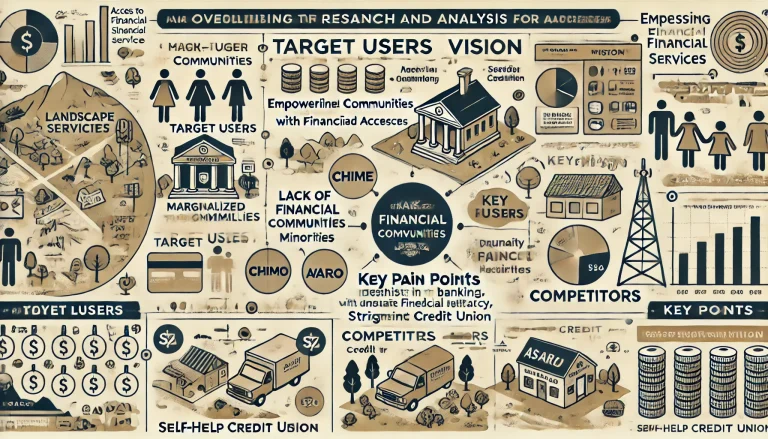Problem Statement:
The rapid rise of fintech companies is transforming the financial landscape, offering consumers direct access to financial services through digital platforms and peer-to-peer networks. This trend, known as disintermediation, allows customers to bypass traditional financial institutions, opting instead for more convenient, cost-effective alternatives. Traditional financial firms face the significant challenge of maintaining their role as intermediaries in this evolving environment. The stakes are high: failing to adapt could result in a substantial loss of market share to agile fintech competitors who offer streamlined services with lower fees and enhanced user experiences. To remain competitive, traditional financial institutions must embrace digital innovation, leveraging new technologies to deliver value-added services that cannot be easily replicated by fintech startups. This will require a strategic shift in how these firms operate, with a focus on customer-centric solutions, advanced analytics, and the integration of emerging technologies such as AI and blockchain. The goal is to create a platform that not only counters the threat of disintermediation but also positions traditional financial institutions as leaders in the digital era.
Pain Points:
- Loss of Market Share: Traditional firms are losing customers to fintech platforms offering lower-cost services.
- Customer Expectations: Increasing demand for fast, user-friendly, and personalized financial services.
- Regulatory Challenges: Navigating complex regulations while integrating innovative technologies.
- Legacy Systems: Outdated infrastructure that limits agility and the ability to innovate quickly.
- Trust and Security: Maintaining customer trust in a digital landscape where security risks are high.
- Cost Pressures: The need to reduce operational costs while investing in new technologies.
- Data Management: Leveraging vast amounts of customer data to provide personalized services.
- Competition from Non-Banks: Tech giants entering the financial space, increasing competitive pressure.
- Adaptability: The slow pace of digital transformation compared to agile fintech startups.
- Talent Acquisition: Attracting and retaining tech talent to drive innovation within traditional firms.

Future Vision:
The platform envisioned will bridge the gap between traditional financial institutions and the digital demands of modern consumers. By integrating cutting-edge technologies like AI, blockchain, and machine learning, the platform will provide personalized, secure, and efficient financial services that meet the high expectations of today’s customers. It will offer a hybrid model, combining the trust and regulatory compliance of traditional banks with the convenience and innovation of fintech solutions. This platform will feature an intuitive user interface, real-time analytics, and advanced security protocols to protect customer data. Moreover, it will be highly adaptable, allowing for seamless integration of new services as the market evolves. The goal is to empower traditional financial institutions to not only retain their customer base but also to attract new customers who value both innovation and security.
Use Cases:
- Digital Banking Services: Traditional banks offering a digital-first experience, with personalized financial products and services.
- Peer-to-Peer Lending: Banks facilitating P2P lending within a secure, regulated environment.
- Automated Investment Platforms: AI-driven robo-advisors providing tailored investment strategies.
- Blockchain-based Payments: Secure, fast, and transparent cross-border transactions using blockchain technology.
- Data-Driven Insights: Utilizing big data to offer customers personalized financial advice and products.
- Cybersecurity Solutions: Enhanced security features protecting customer data from digital threats.
- Mobile Payment Solutions: Integrating mobile payments into traditional banking services for a seamless user experience.
- Regulatory Compliance Automation: AI tools ensuring continuous compliance with evolving financial regulations.
- Digital Identity Verification: Streamlined onboarding processes through secure digital identity verification.
- Omni-channel Customer Support: AI-powered chatbots and virtual assistants providing 24/7 customer service.
Target Users and Stakeholders:
- Target Users:
- Consumers: Age 18-65, both genders, looking for convenient and secure financial services.
- Small and Medium Enterprises (SMEs): Age 30-60, both genders, seeking cost-effective financing and payment solutions.
- Investors: Age 25-65, both genders, interested in automated and personalized investment options.
- Stakeholders:
- Traditional Banks: Concerned with maintaining market relevance and customer trust.
- Fintech Companies: Competitors and potential partners in digital innovation.
- Regulators: Ensuring compliance and protecting consumer rights.
- Technology Providers: Offering the infrastructure and tools needed for digital transformation.
- Customers: Seeking enhanced user experiences, security, and personalized services.
Key Competition:
- Chime: A digital bank offering fee-free financial services with a focus on convenience and customer satisfaction.
- SoFi: Provides a wide range of financial products, from loans to investments, all accessible through a mobile app.
- Square: Known for its mobile payment solutions and Cash App, which allows peer-to-peer money transfers.
- Robinhood: A fintech startup disrupting the investment space with commission-free trading.
- Revolut: Offers banking services, including currency exchange, with a strong emphasis on mobile accessibility.
Products/Services:
- Chime Spending Account: Fee-free checking with early direct deposit and automatic savings features.
- SoFi Invest: Automated and active investing with no commission fees.
- Square Cash App: Peer-to-peer payment app with the ability to invest in stocks and Bitcoin.
- Robinhood Brokerage: Commission-free trading for stocks, ETFs, options, and cryptocurrencies.
- Revolut Global Account: Multi-currency account with fee-free currency exchange and international transfers.
Active Startups:
- Plaid: Facilitates connections between bank accounts and fintech apps, enabling seamless financial data access.
- Brex: Offers corporate cards tailored for startups, with dynamic credit limits based on company performance.
- N26: A mobile bank providing fee-free accounts and easy-to-use budgeting tools.
- Lendio: A marketplace connecting small businesses with lenders for tailored financing solutions.
- Blend: Digital mortgage platform streamlining the loan application process for consumers and lenders.
Ongoing Work in Related Areas:
- AI-Driven Financial Advisory: Startups and established firms are integrating AI to provide personalized financial advice.
- Blockchain for Secure Transactions: Ongoing efforts to use blockchain to enhance the security and transparency of financial transactions.
- Open Banking: Initiatives to create open APIs, allowing third-party developers to build new financial services on top of bank data.
- Cybersecurity Enhancements: Continuous development of advanced cybersecurity tools to protect against evolving threats.
- Digital Identity Solutions: Innovation in secure, digital methods of verifying customer identity to simplify onboarding and transactions.
- Fintech Partnerships: Traditional banks forming strategic partnerships with fintech companies to co-develop new digital products.
- RegTech Innovations: Development of technologies to automate and streamline compliance with financial regulations.
- Customer Experience Optimization: Using big data and AI to improve user experience across digital banking platforms.
- Payment Gateway Improvements: Enhancements in payment gateways for faster, more secure online transactions.
- Personal Finance Management Tools: Development of AI-powered tools that help consumers manage their finances more effectively.
Recent Investment:
- Chime: Raised $750 million in a Series G funding round in August 2021, led by Sequoia Capital, valuing the company at $25 billion.
- SoFi: Raised $500 million in a Series H funding round in May 2021, led by Qatar Investment Authority.
- Plaid: Raised $425 million in a Series D funding round in April 2021, led by Altimeter Capital.
- Brex: Raised $425 million in a Series D funding round in April 2021, led by Tiger Global.
- Robinhood: Raised $3.4 billion in February 2021 through emergency funding rounds to meet collateral requirements.
Market Maturity:
The market for digital financial services is rapidly maturing, with fintech companies leading the charge in disrupting traditional banking models. The widespread adoption of digital platforms for banking, investing, and payments is driven by consumer demand for convenience, lower costs, and personalized experiences. Traditional financial institutions face the challenge of modernizing their services to compete with agile fintech startups. While the fintech sector is still in a growth phase, its influence is reshaping the financial industry, pushing traditional firms to innovate or risk obsolescence. The market is becoming increasingly competitive, with significant venture capital investment fueling the growth of new players, while established firms are exploring partnerships, acquisitions, and internal innovation to remain relevant.
Summary:
The rise of fintech companies has sparked a wave of disintermediation in the financial industry, challenging traditional institutions to rethink their roles. Fintech platforms offer consumers direct, cost-effective access to financial services, bypassing traditional intermediaries. To combat this trend, traditional financial firms must embrace digital innovation, leveraging technologies like AI, blockchain, and big data to offer personalized, secure, and efficient services. The future vision for these firms involves creating hybrid platforms that combine the reliability of traditional banking with the agility of fintech solutions. The competition is fierce, with fintech startups like Chime, SoFi, and Robinhood gaining significant market share. Ongoing investments and developments in areas such as AI-driven advisory services, blockchain security, and open banking are critical to staying competitive. The market for digital financial services is maturing, with traditional firms needing to innovate rapidly to maintain their relevance in a digital-first world. The success of these efforts will determine whether traditional financial institutions can retain their intermediary roles or continue to lose ground to fintech disruptors.



